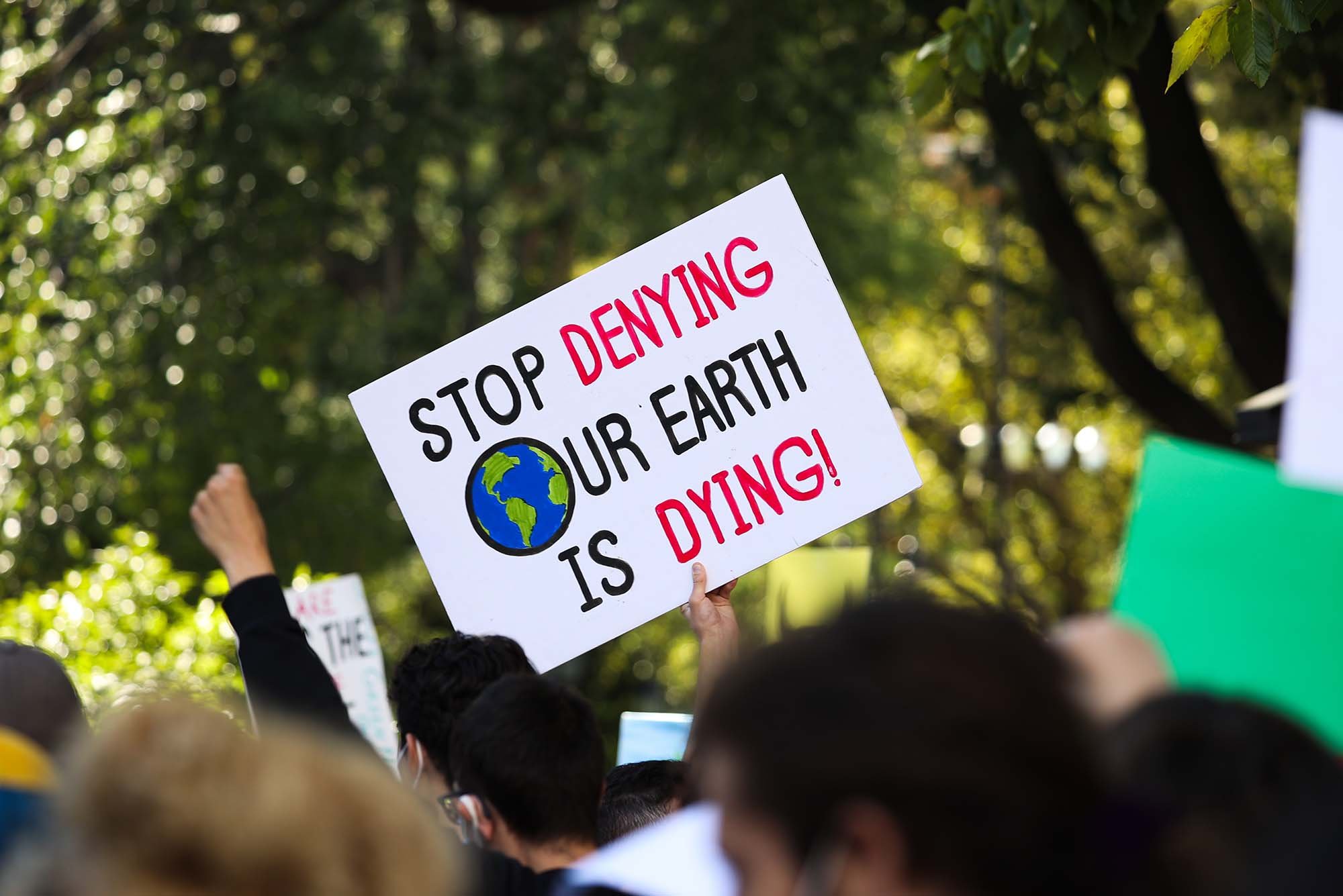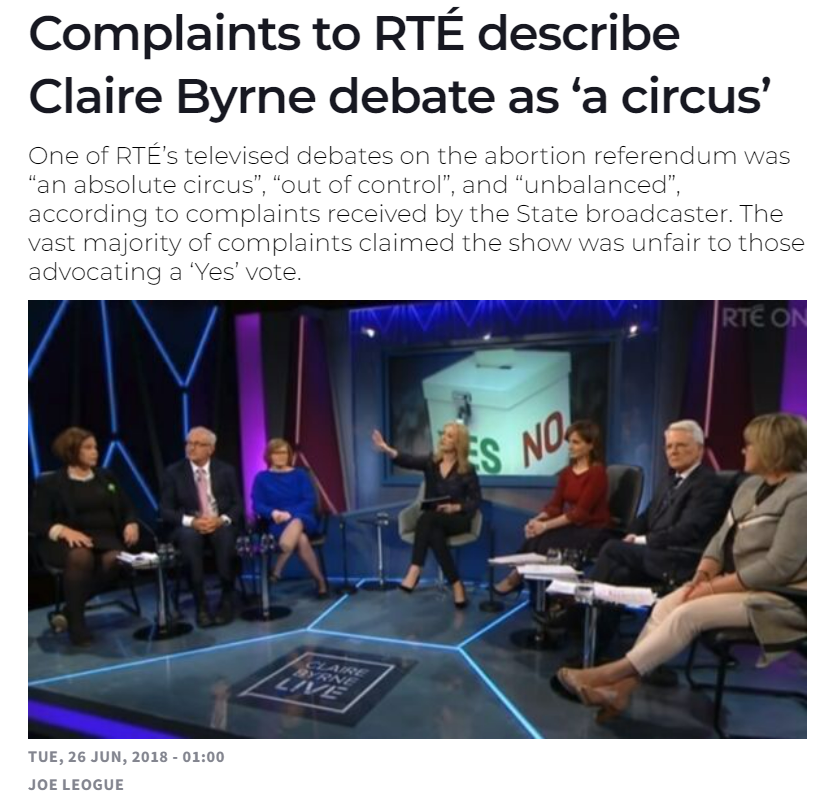
Why Does The Irish Press Still Platform Climate Denial?
Recently I was asked by a journalist from RTE to be interviewed about the reason why I support a ban on SUVs. The article, they informed me, is part of a series called Upfront: The Conversation, which presents two conflicting viewpoints on a topic.
Previous examples have included whether nightclubs should say open until 6am, or if as cashless society is a cause for concern. The journalist informed me that this approach was of particular interest to the younger 16-35 audience.
Some of these make for an interesting time capsule of current cultural debate and offer a window into the complexity of Irish society in 2023.
Others represent something far more concerning: the continued prevalence of climate denial in Irish media.
Bias vs Balance
Time and time again we have seen the Irish media enforce the idea that we must have ‘balance’ in public debates. Yet their idea of balance is pitching two polar opposites against one another, regardless of how that impacts the educational value of the discussion.
Nowhere was this clearer than in the 2017/18 public debates over the right to have abortion access, where clerics were given the same platform as doctors, despite their implicit bias and lack of medical qualifications.
Balance doesn’t always mean reflecting two sides of a story – but having one informed discussion where an expert can fairly represent both perfectives.
Research from Northwestern University highlights the dangers of ‘bothsidesism’ or false balance reporting, and how it can damage the public’s ability to distinguish fact from fiction, and lead audiences to doubt the scientific consensus on the Climate Crisis.
The Irish media has consistently courted controversy for engaging in ‘bothsidesism’ in their public debates, promoting the spectacle of debate over the value of the conversation. Credit: Irish Examiner
Yet, all too often, Irish coverage of the Climate Crisis is marked by platforming climate deniers with no viable or relevant qualifications, who are often given more airtime because their views are less challenging to the status quo, more reassuring to the audience at home, or more antagonistic and therefore build ratings.
All of which is to the vast detriment of climate education and climate action.
Trust & Transparency
The day before the interview about the SUV ban I found out who I was to be debating with. The person’s LinkedIn profile described them as: “An experienced lobbyist advising a small number of clients in the transport sector”.
True to form, the commentator who opposed the idea of the ban repeatedly engaged in climate denial throughout the interview: “We should be honest and say that this particular debate has nothing to do with the climate/ I can’t accept your linkage, emphasised past the point of distortion, between SUVs and climate change.”
These statements came against the clear facts that I presented:
The combustion-related CO2 emissions of SUVs increased by 70 million tonnes in 2022 – with the 330 million SUVs on the road today emitting nearly 1 billion tonnes of CO2 annually
SUVs were the second largest contributor to the increase in global CO2 emissions between 2010-2018 – more than heavy industry, aviation and shipping
If SUV drivers were a single nation, they would rank as the seventh biggest greenhouse gas emitter on Earth
The most popular SUV models on sale in Ireland today will produce 60 tonnes of CO2 over their lifetime – more than the carbon fairshare needed to stay below the vital 1.5C target
For every five SUVs sold, they cancel out the emissions benefits of one EV – and lock in decades more of greenhouse gas and microplastic emissions
Electric SUVs only move the same problem of excessive consumption – and excessive road deaths – into a new form. They do not represent progress or a just climate transition
Between 2010-2018 they accounted for the second largest growth in CO2 emissions worldwide. The role of SUVs in increasing energy consumption and emissions is undeniable. Even if climate deniers don’t want to recognise it. Credit: The Guardian/IEA
Regardless of whether you think there should be a ban on SUVs or not, their role in worsening the Climate Crisis is clear-cut. Ignoring the evidence repeatedly and rejecting that outright in the face of independent, verifiable data is categorical climate denial.
He can disagree with me about whether he thinks SUVs should be banned or not – that is his prerogative. There are important nuances to be discussed were a ban to be introduced, such as the potential for an exception for people with accessibility needs that might benefit from a vehicle with, say, more space for a wheelchair.
The merits of that would need to be weighed up in partnership with accessibility groups to understand if estate cars might cater for their needs or whether SUVs offer the best solution. In which case, an exemption to the ban would be more than justifiable.
He raised none of these points.
Instead, he repeated the same tired climate denial that has been platformed across multiple Irish publications – namely that he believes there is no correlation between SUVs and the Climate Crisis. This assertion came in spite of a plethora of data to the contrary.
In fact, his climate denial was founded purely in opinion, with no evidence to offer constructive counterpoints, merely the assertion that: “You cannot always invoke climate as a moral trump card to deploy in every argument.”
The same can be seen in his interview on the Pat Kenny Show, where Professor Brian Caulfield shared clear data of how SUVs consume excessive energy, produce excessive emissions, require more space for parking, and consume more raw materials.
Both my interview for RTE and Professor Caulfield’s interview with Newstalk against the same climate denier were also marked by the denier being given more opportunities to put their side across too. So much for balance.
No Consequences
When preparing to speak on RTE TV, RTE Radio or contribute to an article, the journalists at the national broadcaster are always very careful to point out the legal ramifications if you were to use brand name examples of greenwashing, climate denial or other wrong doing – you must speak in the broadest terms, as they fear being sued.
Yet the same consideration isn’t given to the broader consequences of climate denial – nor issues like racism, xenophobia or access to abortion.
We can see this even in the last week, where an RTE broadcaster engaged in flagrant climate imperialism, attempting to shake off Ireland’s enormous and growing emissions by using whataboutism to point the finger at other nations because they have larger emissions.
This ignores Ireland’s disproportionate per capita emissions.
There are no consequences for our media or the climate deniers they platform.
Research from Northwest University demonstrates that the inclusion of climate deniers in the media has considerable detrimental impact on belief in the Climate Crisis, with their inclusion lowering belief in almost all instances. Credit: When Fairness is Flawed: Effects of False Balance Reporting and Weight-of-Evidence Statements on Beliefs and Perceptions of Climate Change - Megan N Imundo
Their efforts will lock in decades more of emissions, increase the likelihood and intensity of extreme weather events, increase the likelihood of severe famines worldwide, perpetuate the deaths of millions, contribute to the displacement of billions.
But they’ll still be platformed talking about how these things aren’t connected to the Climate Crisis.
And, of course, its easy to do so: climate denial isn’t burdened by facts. It is founded in nothing but opinion.
Ultimately, on this occasion, I decided it was better to be part of the conversation and share the data that I have spent days researching over the last couple of years, so that anyone reading the article could hopefully come away seeing the undeniable link between SUVs, the Climate Crisis and lowering road safety standards.
You can read the article/debate in question here.
Nonetheless, the platforming of climate denial across print, online, radio and TV in Ireland is of great concern. There has been no discernible effort to address this from the Irish press, and it demonstrates the severe lack of accountability in Irish media – despite several promises to improve.
If you feel strongly that there is no place for climate denial in the Irish press in the face of the Climate Emergency, we strongly urge you to sign Angela Deegan’s petition: Stop Giving Airtime to Climate Deniers on Irish Media.
The petition already has over 1,000 signatures and sends a clear message to the press and Irish politicians that we need higher standards and accountability on this global issue.
What To Read Next
RTÉ Refuses To Address Climate Coverage Failings
RTÉ refuses to be transparent or accountable for its continued failings in reporting the severity, scale and urgency of the Climate Crisis
Syndicated Media & Climate Misinformation
Syndicated articles expose a golden opportunity for the media to replicate greenwashing and misinformation, as recent examples in the Irish press demonstrate





